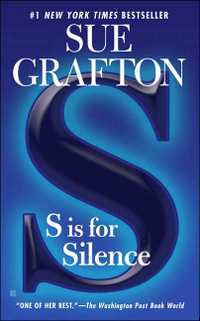
I have a theory that when an author becomes really, really big, the editors don’t read the manuscripts very closely, if at all. That’s especially true with Robert B. Parker. His books are usually laced with errors (for instance, in his latest Jesse Stone novel, STRANGER IN PARADISE, the spelling of the name of a big estate keeps changing). What brings this to my mind today is a sentence on page 169 of Sue Grafton’s S IS FOR SILENCE that really boggles me. Her heroine Kinsey Milhone is in a sleazy motel room and makes this observation:
My bedspread smelled musty, and I was happy I didn’t see the article about dust mites until the following week.
How could she have been happy about something that hadn’t happened yet?!

I think that’s a certainty. Look at what happened to Ken Follett and Robert Ludlum.
Yeah, I _know_ Ludlum’s long dead and probably arguing with God over revisions in the latest manuscript.
I’ve been pondering the latest Robert B. Parker ever since I read it. the estate thing I noticed, as well. But one of my problems was the entire “I’m not gonna arrest him because of the statute of limitations thing.” I was thinking, if I were a cop and he walked into my office, I’d handcuff him, throw him in a cell, call the D.A. and say, “Now he’s your problem.”
Failing that, I’d cuff him, throw him in a cell, call Rita Fiore and say, “Every single victim and victim’s family from that heist can now file a class action civil lawsuit on this guy. Interested?”
What I couldn’t see myself doing was what he did, which is to say, not much, but to let the guy wander around the county shooting people.
Lee, Lou, I agree with you, I’ve been saying that for years!
I am posting a Critique / Review on “The Invisible” by Andrew Britton @ BookReporter.com. It fits right in with your editing comment. Should be available next Friday.
Poor editing can do a lot of harm to upcoming writers.
That is very true. Some authors use their success to resist editing. After Allen Drury won a Pulitzer for Advise and Consent, he would scarcely let an editor touch his work, and it declined precipitously. After Larry McMurtry won a Pulitzer for Lonesome Dove, he produced The Streets of Laredo, a related novel that desperately needed editing and was so slovenly it was an embarrassment.
I’m not sure it’s always the author who is using his success to resist editing. It may be the editors.
I think I read it in one of Neil Simon’s two memoirs… after BAREFOOT IN THE PARK and THE ODD COUPLE, people (agents, editors, directors, producers) rarely gave him any advice or feedback. Their feeling seemed to be, who am I to tell Broadway’s most successful playwright how to write? And he missed it! He would have appreciated that kind of feedback, but he felt that people were afraid to give it anymore.